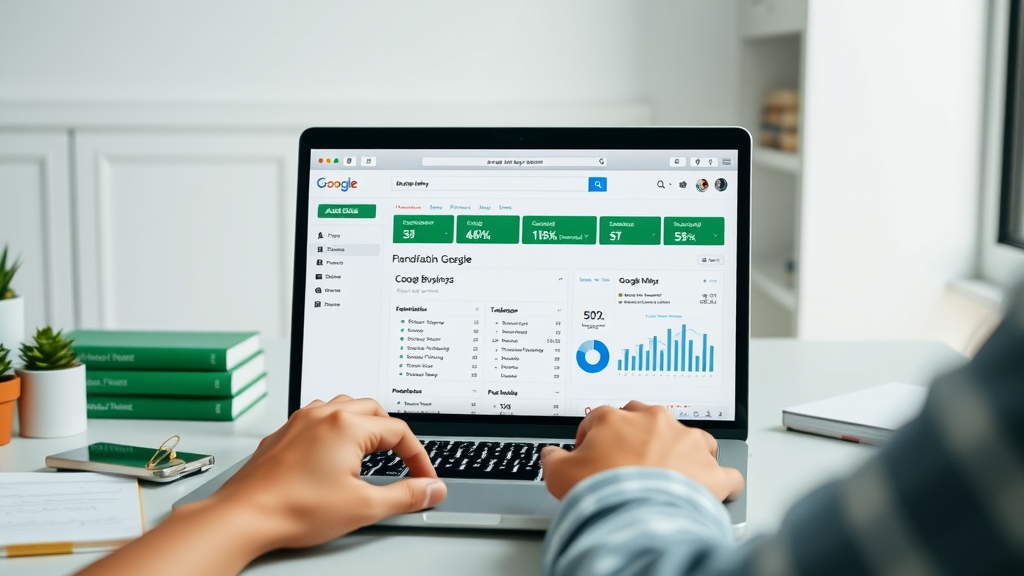Did you know that over 50% of small businesses close within five years—often due to ineffective marketing? If your small business is struggling to find its footing, the missing piece may not be your product or service—it could be your business marketing strategy . In today’s fast-paced business market , understanding how to reach your ideal customers is more important than ever. This comprehensive guide will give you the up-to-date tools, real-world tactics, and actionable solutions you need to not only survive, but thrive.
Why Small Business Marketing is Your Most Powerful Growth Tool
- Did you know that over 50% of small businesses close within five years—often due to ineffective marketing? Learn why your business marketing approach determines your future in a competitive business market.

Small business marketing isn’t just about getting your name out there—it’s about ensuring the survival and growth of your venture. In a world where the business market constantly evolves, the right marketing approach helps you build a loyal customer base , outshine competitors, and secure sustainable growth. Consider the thousands of businesses in your town or city alone. The ones that develop a strategic marketing plan remain top-of-mind with their customers, while others fade into the background. Whether you’re a first-time business owner or a seasoned operator launching a new product or service , smart marketing is your best defense against closing your doors.
The competition is fierce—and today’s consumers are bombarded with choices, making strategic small business marketing a necessity rather than an afterthought. From social media to digital marketing channels, small businesses that invest in their marketing efforts are better equipped to pivot, adapt, and turn potential customers into loyal advocates. When your business marketing is deliberate and data-driven, you can amplify your brand, draw in more foot traffic (and web traffic), and watch your revenue grow year over year.
Breaking Down the Essentials of Small Business Marketing
- Explore core business marketing principles, the value of a strategic marketing plan, and how social media and digital marketing help small businesses find their target audience in today’s business market.
Every great small business marketing effort is built on solid fundamentals: a clear understanding of your target market , clearly defined business goals, and a brand message that resonates. At the heart is your marketing plan —this is your roadmap for identifying what makes your business unique, who you want to reach, and how you’ll connect with them in a crowded business market.
It’s also critical for small business marketing to embrace tools like social media and digital marketing. Platforms such as Facebook and Instagram enable even the smallest local business to reach hundreds or thousands of potential customers daily. Coupled with a strong website and focused search engine efforts, these channels broaden your reach, help you gather market insights, and build lasting relationships with both new and existing customers.
What You Need to Know About Small Business Marketing
- In this guide, discover actionable marketing tools, why a holistic marketing strategy matters, and advanced techniques for crafting and refining small business marketing plans that attract potential customers.

Navigating the world of small business marketing can be overwhelming—but it doesn’t have to be. To get results, you need to combine practical tools with a holistic strategy. This means thinking beyond one-off tactics in favor of an integrated approach—where every marketing tool (social media, email, content, SEO, and more) plays a distinct but connected role in your marketing plan .
By following the actionable steps outlined in this guide, you’ll learn to identify your real target audience , engage your ideal customer , experiment with top small business marketing tools, and measure what works. Forget scattered efforts—effective business marketing means working smarter, not harder, to drive meaningful growth and maximize every resource dollar.
What You’ll Learn in This Small Business Marketing Guide
- Why small business marketing is crucial for sustainable growth
- How to build a strategic marketing plan
- The best marketing channels and tools for small businesses
- Techniques to identify and reach your ideal and potential customers
- Measuring results and fine-tuning your marketing strategy
Small Business Marketing Fundamentals: Building Your Foundation
Conducting Market Research for Small Businesses
- Learn methods for understanding the business market, defining your target audience, and building an effective business profile.

Market research is the cornerstone of any successful small business marketing plan. Without deep knowledge of your business market and target market , your efforts risk missing the mark and wasting precious resources. Start by gathering data about your industry, competitors, and potential customer preferences. This can involve formal surveys, analyzing search engine trends, reviewing industry reports, or simply observing what businesses with strong customer bases are doing differently.
Once you’ve gathered insights, define clear audience personas—who is your ideal customer ? Are they young professionals, families, local college students, or another key group? Understanding demographics (age, gender, income) and psychographics (interests, values) will help you craft a business profile that appeals directly to those who matter most to your small business success. Effective market research sharpens your entire business marketing approach, ensuring your message is heard by the right people at the right time.
Setting SMART Goals for Your Small Business Marketing Plan
- Develop measurable objectives tailored for your small business needs and the competitive business market.

Clear goals are the backbone of any small business marketing strategy. Adopting SMART goals—Specific, Measurable, Achievable, Relevant, and Time-bound—will transform abstract ambitions (“I want more customers”) into actionable targets (“Increase online appointment requests by 30% in six months via social media and email marketing”). This approach not only keeps your team focused, it makes it far easier to measure success and adjust your strategy as the business market shifts.
For example, is your priority to grow your email list , boost walk-in traffic, or enhance your digital footprint in search engine results? Map out these priorities within your small business marketing plan, attaching concrete KPIs (Key Performance Indicators) and timelines. The result: marketing efforts that are focused, trackable, and significantly more likely to deliver meaningful growth for your small business.
Creating a Winning Small Business Marketing Strategy
Identifying Your Target Market and Ideal Customer
- Pinpoint your target market, define your ideal customer, and adjust your products or services to match their needs.

Your target market is the foundation on which the rest of your small business marketing plan stands. Begin by segmenting your audience into clear groups based on demographics, location, buying habits, or shared needs. This allows you to design marketing messages and offers that resonate with your ideal customers — the people most likely to buy from you regularly.
Fine-tune your products or services to match what your target audience values. For instance, if your research shows time-strapped professionals are your top buyers, emphasize convenience and fast service in your messages. By aligning your business marketing approach with your ideal customer’s needs and challenges, you not only boost engagement but also increase the likelihood of turning first-time buyers into loyal, long-term advocates.
Choosing the Right Marketing Channels for Small Businesses
- Compare cost-effective marketing channels—social media, email marketing, digital marketing, search engine optimization—and their effectiveness for business marketing.

With limited budgets and resources, small businesses must be deliberate in their selection of marketing channels. Start by evaluating where your target market spends their time—do they scroll Instagram, read local blogs, check email daily, or use Google to discover new businesses? The most cost-effective social media platforms include Facebook and Instagram, where targeting features enable you to reach specific audiences in your business market. Complement social media with email marketing; building a robust email list lets you foster direct, ongoing connections with your customers at a low cost.
Also, don’t underestimate the power of digital marketing and search engine optimization (SEO). A well-optimized business website brings organic traffic directly to your products or services, lifting you higher in relevant search results. By regularly assessing which marketing channels generate the most engagement and conversions, you can prioritize your efforts and avoid wasting budget on platforms that don’t serve your business marketing goals.
Integrating Social Media and Digital Marketing
- Harness platforms like Facebook, Instagram, and LinkedIn to maximize brand reach and engagement in the small business ecosystem.
Social media isn’t just a promotional platform—it’s where brand communities are formed, and conversations about your products or services unfold. For small business marketing, focus on platforms that align with your target audience . Facebook is ideal for community engagement and local promotions, while Instagram’s visual format suits lifestyle and retail brands. LinkedIn is a top choice for B2B small businesses seeking to build authority and expand their professional network.
Integrate your social media strategy into your overall digital marketing efforts. Pair engaging content and regular posting with targeted ads to drive traffic to your website or event signups. Use digital marketing tools, like social scheduling platforms, to streamline workflow and maintain consistency across channels. Strong integration between social and digital marketing not only builds your brand but also drives measurable results in the business market.
The Role of an Email Marketing Plan in Small Business Success
- Construct a persuasive email list, deploy email marketing campaigns, and measure your success using marketing tools and Google Analytics.
An email marketing plan remains one of the most powerful tools for small business marketing. By building a quality email list—consisting of engaged leads and existing customers—you maintain a direct line to your audience. Start with a compelling opt-in incentive (a discount, free tip sheet, or exclusive content) to grow your list.
Once your list is established, segment it for relevance: new leads receive welcome sequences, while repeat customers get loyalty offers and updates. Use segmented, personalized campaigns to foster strong relationships and drive repeat business. Analyze open and clickthrough rates in tools like Mailchimp or Google Analytics to measure your impact and continuously refine your small business marketing efforts for maximum ROI.
Maximizing Your Reach: Using Marketing Tools That Deliver Results
Essential Marketing Tools for Small Businesses
- Overview of top tools: Mailchimp, Google Analytics, Hootsuite, Canva, and more
- Tools for content creation, scheduling, analysis, and customer engagement

Modern marketing tools empower small businesses to compete with larger rivals. Consider these essentials: Mailchimp for email list management and campaigns, Google Analytics for in-depth web traffic and campaign analysis, Hootsuite for scheduling and managing social media accounts, and Canva for creating eye-catching marketing materials and social posts even if you’re not a design pro.
These tools help you create, plan, execute, and analyze campaigns with ease, freeing up time and resources for other pressing business tasks. Whether you’re running promotions, managing social media, or monitoring customer engagement, the right toolkit keeps your small business marketing efforts agile and data-driven in an ever-changing business market.
Leveraging Search Engine Marketing and Optimization
- Boost website visibility with SEO best practices, keyword research, and Google My Business for small business marketing.

Effective search engine marketing ensures your small business stands out in relevant search results. Begin by optimizing your website using well-researched keywords, clear meta descriptions, and strategic content updates—this not only improves your ranking but also helps customers find your products or services more easily. Tools like Google My Business allow you to optimize your business profile, ensuring your company shows up in local search results when potential customers are looking.
Pair SEO efforts with pay-per-click campaigns for even greater visibility in the business market. Regularly review performance through analytics and adjust your keyword focus or content to align with changing user interests. A well-maintained business profile and optimized digital presence can swiftly boost your reputation, engagement, and conversion rates.
Tracking and Analyzing Success with Google Analytics
- Set KPIs, monitor website and campaign performance, and make data-driven business marketing decisions.
Google Analytics is indispensable for small business marketing success. Begin by establishing clear KPIs—these might include website traffic, email list growth, conversion rates, or inbound lead volume. By integrating all marketing channels into your Google Analytics dashboard, you get a full picture of how visitors interact with your business across platforms.
Use these insights to spot trends, identify what’s working, and tweak campaigns on the fly. Whether you’re monitoring the impact of a business profile update, comparing marketing channels, or assessing customer flows, actionable data empowers you to make better decisions and continually improve your return on marketing investment.
Crafting a Standout Business Profile for the Business Market
Building Trust: Your Online Business Profile
- Showcase credibility through testimonials, case studies, and up-to-date business information across all digital channels.

In a marketplace driven by reputation, a strong online business profile is non-negotiable. Display customer testimonials, case studies, awards, and accurate business information to immediately boost trust with new potential customers. Your business profile should live not only on your website but also across social media platforms and popular directories like Google My Business or Yelp.
Regularly update your profiles to include current hours, new products or services , and respond promptly to reviews. This visibility not only influences purchase decisions but also strengthens your search engine rankings. An authentic, up-to-date business profile signals professionalism—crucial for converting leads into loyal buyers in today’s competitive business market.
Optimizing for Local Search and Google My Business
- Attract more local potential customers by optimizing your business profile for search engine local listings.
If you run a local business, optimizing for local search is essential. Complete every section of your Google My Business profile—business name, description, categories, images, location, and hours. Add fresh photos regularly, and encourage customers to leave reviews. These steps significantly improve your ranking in map packs and local search results, increasing your visibility to customers in your neighborhood.
The more complete and active your business profile, the higher Google will rank your business above competitors with incomplete data. Consistency across all online listings further boosts your brand credibility and ensures that potential customers find accurate information when they’re ready to buy.
| Tool | Best For | Key Features | Starting Price |
|---|---|---|---|
| Mailchimp | Email Marketing | Email campaigns, automation, segmentation | Free / Paid |
| Google Analytics | Website Analytics | Traffic reports, goals, audience insights | Free |
| Hootsuite | Social Media Management | Scheduling, analytics, engagement tracking | Paid |
| Canva | Content Creation | Templates, graphic design, collaboration | Free / Paid |
Turning Potential Customers into Loyal Advocates
Building an Engaged Email List and Community
- Strategies to nurture leads, keep your business marketing message relevant, and turn prospects into repeat buyers
An engaged email list is more than a communication tool—it’s your direct line to ongoing customer relationships. Create a compelling lead magnet (like a helpful guide or discount) to encourage sign-ups. Use follow-up sequences to nurture new subscribers with valuable insights, business updates, and exclusive offers related to your products or services.
Stay in touch through regular, relevant outreach to keep your message top-of-mind and your audience invested in your brand. Active email list management—removing inactive subscribers and segmenting by customer type—ensures higher deliverability, engagement, and conversions as your business grows.
Personalization and Segmentation: The Key to Small Business Success
- Use marketing tools to segment audiences and deliver personalized experiences at scale.
Today’s customers expect tailored experiences. Use marketing tools to group your audience by interests, behavior, or purchase history. Then, personalize your business marketing: send local deals to nearby customers, or reward loyal buyers with VIP offers. This degree of customization increases response rates, fosters loyalty, and makes every customer feel valued.
By combining segmentation with automation features in platforms like Mailchimp or Hootsuite, you can deliver relevant content at exactly the right moment—without constant manual effort. Building this level of personalization into your small business marketing creates lasting connections and drives long-term growth.
“The cost of being wrong in small business marketing is less than the cost of doing nothing.” – Seth Godin
Small Business Marketing in Action: Real-World Success Stories
- See how businesses like yours increased visibility and sales with creative business marketing and digital tactics.

Real-world results prove the power of strategic business marketing. Take, for example, a family-run bakery that used Instagram stories to showcase daily specials—resulting in a 40% increase in morning foot traffic. Or a local salon that launched an email marketing campaign, complete with loyalty discounts and reminders, doubling their appointment bookings in one quarter. These businesses used digital marketing tools and analytics to refine their messages, understand what resonated, and adapt their offerings to keep customers coming back.
By consistently applying the techniques laid out in this guide—market research, goal-setting, smart use of marketing tools , and data-driven adjustments—your business can experience similar, measurable growth. When you put your small business marketing plan into action, you not only boost revenue but build a brand your community trusts and talks about.
People Also Ask About Small Business Marketing
What is the best marketing for a small business?
- The best marketing for a small business is a tailored mix of digital marketing, social media, local SEO, and email marketing. Focus on channels where your target audience spends the most time and choose marketing tools that offer measurable ROI.
What is the 3-3-3 rule in marketing?
- The 3-3-3 rule advises sharing three types of content, three times a week, across three main platforms, ensuring consistency and reinforcing your small business marketing message throughout the business market.
What is a small business marketing?
- Small business marketing encompasses the strategies and methods used by small businesses to attract, engage, and retain customers, using various channels like social media, email, and digital platforms.
How do I market myself as a small business?
- Market yourself by building a professional business profile, defining your unique value proposition, consistently engaging on relevant marketing channels, and leveraging word-of-mouth and customer testimonials.
Best Practices and Tips for Effective Small Business Marketing
- Define your goals and target audience clearly.
- Invest in a strong, consistent brand presence.
- Choose marketing tools that integrate and scale with your business.
- Track results and pivot your business marketing strategy as needed.
- Leverage cost-effective digital marketing and social media to maximize ROI.
Frequently Asked Questions on Small Business Marketing
- How much should I invest in small business marketing? While budgets vary, most experts recommend allocating 7–8% of gross revenue to marketing to achieve sustainable growth. Invest wisely to ensure your spend is targeted and measurable.
- Can I outsource business marketing on a small budget? Absolutely. Many freelancers and agencies offer affordable marketing services, from social media management to email campaigns, allowing you to compete with bigger brands without breaking the bank.
- Which metrics matter most for small businesses? Focus on conversion rates, customer acquisition cost, email list growth, website traffic, and return on investment (ROI) to assess your small business marketing success.
- How do I build an email list from scratch? Offer something valuable in exchange for sign-ups (discount, guide, free trial). Promote your email list through your website, social media, and in-store materials.
- What are the most effective marketing strategies for new small businesses? Prioritize a distinct online business profile, local SEO, targeted social media outreach, and consistent email nurturing as foundational strategies for new small businesses.
Action Steps to Launch or Improve Your Small Business Marketing Plan
- Conduct or update your market research to define your business marketing approach.
- Set or refine clear marketing goals using the strategies above.
- Experiment with 2-3 new marketing tools to streamline operations.
- Enhance your business profile on Google My Business and major social platforms.
- Monitor progress with Google Analytics and adjust based on results.
“Marketing is no longer about the stuff that you make, but about the stories you tell.” – Seth Godin
Need an Affordable Small Business Marketing Expert?
- Ready to grow your business without the full-time CMO price tag? Let’s talk about how our affordable, on-demand marketing leadership can work for you. 👉 Call, text, or schedule your FREE consultation today at https://aiwebforce.com/contact-us/
Conclusion: Take action now—define your goals, pick the right marketing tools, and measure what works. The business market won’t wait, and your small business deserves to stand out.
To further enhance your small business marketing strategies, consider exploring the following resources:
-
“Small Business Marketing in 2025” : This guide offers ten innovative marketing ideas tailored for small businesses, including creating referral programs, collaborating with local businesses, and hosting events to engage your community. ( xero.com )
-
“5 Marketing Strategies to Grow Your Small Business” : This article emphasizes the importance of defining your target audience, developing a personal brand, and building a professional website to effectively market your business. ( mbopartners.com )
By integrating these insights into your marketing plan, you can develop a more comprehensive and effective strategy to reach and engage your target audience.

